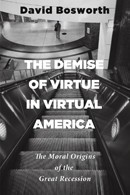Entrance:Virtual America’s Convention Hall
Demise—1) the conveyance of an estate 2) transfer
of the sovereignty to a successor 3) a: death b: cessation
of existence or activity c: a loss of position or status
—Merriam-Webster’s Collegiate Dictionary
_________________________________________________
In 2008, the U.S. stock markets lost almost seven trillion dollars of shareholders’ value, and in the aftermath, the very experts who had recently boasted that we had scientifically solved the instability inherent in our economic system’s boom-bust cycle were suddenly sounding more like English Ph.D. students as they turned away from their arcane mathematical formulas to cite the history of a single word. Ambushed by a financial meltdown they had failed to predict, these reluctant etymologists were rediscovering that the word credit evolved from the Latin credo, meaning I believe. They were reminding themselves, even while informing a stunned American public, that the whole enterprise—their supposedly self-correcting marketplace, this highly rationalized perpetual motion machine of unending material prosperity—actually floated on faith, on belief. And as the numbers then proved, that faith had been radically misplaced.
The dive in stock values then may have been devastatingly quick, but the evolution of the bad faith driving their collapse is a much longer story, and the one this book aspires to tell. It is the story of a profound transformation in the national character, in our actual and not just ceremonial credo, and how an American ethos initially geared toward prudence, pragmatism, and plain speaking came to generate instead the greatest con game in human history. It is not simply the tale of an economic crash but of a failure of the moral imagination in the broadest sense, one whose impact could be spied in the barbarism at Abu Ghraib, the cynicism of pop culture, the co-opting of art, the corruption of science, the decline of both family ties and local communal authority, and in the enfeeblement of commonsense thinking that helped license them all.
To accurately assess a series of changes this widespread requires forgoing the usual parochial blame-game, with its scornful scapegoating of this or that corrupt official. The problem hasn’t been just a few “bad apples,” nor even a mismanaged orchard on the left or the right, but the long-term revision of a cultural environment whose “moral field” we all share and for whose current ill health we are collectively, if not equally, responsible. To make sense of that decline, we need to consider instead a broader set of ruling ideas, managerial decisions, and architectural designs that, taken together, have slowly revised the underlying logic of everyday experience and so, too (if often cryptically) our conventional beliefs about the good, the true, and the beautiful.
Already I trespass into controversial territory on two fronts. In the land of the free, where rebellion has been historically esteemed and is now routinely marketized through the many iterations of MTV, few would choose to define themselves as conventional thinkers. So it is that movie stars grown rich on the most fatuously formulaic of cinematic plots tout their hobby-horse causes with the moral fervor of Samuel Adams, while right-wing sons of multimillionaires storm the Bastille of the inheritance tax, using the fervent rhetoric of liberation. I have sat through meetings where the most slickly ambitious of academic administrators have proclaimed themselves subversive and seemed to believe it. Even those who profess to hate the sixties tend to borrow its ruling temper, the moral grandeur (and personal exemption) of romantic rebellion. Like the relaxed jeans we now wear, the role of rebel has been stretched to fit a wide range of self-promoting careerists, from Lady Gaga to Ayn Rand acolyte Paul Ryan.
In an age characterized by the adman’s omnipresent ironies, such pseudo-rebellion has become a standard stance: an unacknowledged plank in the platform enforced inside our new convention hall. Although it is not my intention to deny the uniqueness of individuals or the diversity of the many subsets of our postmillennial society, I will insist in the chapters to come that an ever-expanding ruling philosophy has been drawing all our many vivid differences in the same overall direction, and that, as a consequence, it is not only still possible but increasingly necessary to describe the American experience in the first person plural, the collective we.
The second of my controversial assertions is the insistence on linking, in these claims about our conventional thinking, the good with the true. In a nation that touts objective expertise and cedes to its technocratic elite enormous political as well as cultural authority, overt discussions of moral premises are seen as embarrassingly archaic. Like spells against witchcraft, complaints about “character” are thought to belong to a bygone era. Instead, our new credo presumes that soon, very soon, our bad behavior will be scientifically solved, our dysfunctions debugged by our pharmaceutical labs and by the better angels of our beltway think tanks’ latest apps. I don’t dispute that our culture war debates have been debased and, yes, embarrassing. But the poor quality of our discussions about the virtues we prefer in no way discounts the importance of the subject and is, in fact, a symptom of the very demise under study here. As etymology reminds us, all evaluations are expressions of value, and an objective expertise that refuses to acknowledge its own (and necessarily subjective) ethical premises is all the more likely to lead us astray. Methodically blind to its own motives, such a science is especially susceptible a self-deceiving disingenuousness.
In an attempt to suggest both its temper and its tactics, I have been calling this self-deceiving science of ours Evangelical Mammonism. Like most manifestations of modernity, the roots of its practice reach back to the philosophical turn toward rational materialism in the seventeenth and eighteenth centuries. Insomuch as they led to the scientific and industrial revolutions, the core ideas of this philosophical approach have been highly influential, but social history and tradition have also mattered. When practically applied, any new philosophy will assume something of the tenor of the cultural place and time of its adoption, resulting in very different species of social governance. In the East, rational materialism eventually assumed the form of a “scientific socialism” (aka Communism), which, despite its purported ideals, generated many of the moral catastrophes of the last century. Earlier in the West, this philosophy, however, took on a very different form, one in which the collateral cruelties of a highly productive but narrowly focused economic system—let’s call it “scientific capitalism”—were gradually ameliorated by the institution of various kinds of democratic reform.
In America, that often tenuous equilibrium between economic interests and democratic practices has now been broken, and one sign of the ineptitude of our cultural wars has been a refusal to recognize this growing imbalance as a primary source of the ethical changes driving our debates. For as was made manifest by the astonishing scale of fraud and folly that generated the housing bubble, the critical ethical issue of our era has not been the erosion of the separation between church and state (whichever side one thinks is the true transgressor) but the gradual conversion of both populist Christianity and democratic governance to the ways, means, and ruling ideals of Evangelical Mammonism.
Some notes on terminology, then. By Evangelical Mammonism I mean the now toxic version of scientific capitalism that has been progressively usurping the traditional authority of church and state, even while shirking the ethical responsibilities that normally attend them. Like most forms of rational materialism, this version is utopian in cast, evangelically touting the “good news” of one or more final solutions to the human predicament: not just the elimination of the boom-bust cycle, but the happy “end of history,”1 the erasure of pain or even death, and (in the worried words of T. S. Eliot), the creation of “systems so perfect that no one will need to be good.”2 Given that the path pursued to achieve this good news focuses so fiercely on material improvements and acquisitions, it is aptly classified as a latter-day form of Mammonism, and like all Mammonites, its adherents tend to cleave, self-consciously or not, to the crude moral premise that more must equal better. As our promiscuous use of the summary cliché “the bottom line”now proves, most forms of evaluation these days are becoming a subspecies of financial accounting. Under the sway of Evangelical Mammonism, all higher meanings, sacred or secular, are made to submit to the measures of money.
The title, Entrance: Virtual America’s Convention Hall, metaphorically suggests how our conversion to this decadent credo has been taking place. Due to the penetration of electronic communications over the last hundred years and to the privatization of civic spaces during the last sixty, we now routinely convene inside a virtual America in both senses of that word: we are increasingly enclosed within a deceptive physical and digital sphere whose supposed allegiance to traditional values routinely conceals their active subversion. The demise of virtue inside this new Virtual America refers, then, to two of the definitions of the word cited earlier—not just “a loss of position or status” but also the “transfer of sovereignty to a successor.” That transfer is best understood as a radical shift in the balance of power between everyday moral influences as the nation’s two foundational ethical traditions, the republican and the Judeo-Christian, are both yoked to serve the now conventional beliefs of Evangelical Mammonism.
A few brief examples of this submission will have to suffice for now. Politically, the conservative’s often honorable resistance to the intrusion of the state into local affairs has increasingly fronted for corporate interests whose own impact on local life is even more destructive to the very customs that conscientious conservatives have traditionally revered. On the civic front, the deep penetration of marketplace values can be traced in all those liberal universities and newer philanthropies that now focus so fiercely on polishing their “brand.” And any possible spiritual resistance to our age’s unrepentant materialism has been greatly weakened by the popularity of a so-called prosperity theology that is little more than Mammonism in pious disguise.
The period covered in the analysis to come begins in the 1950s, when these trends—already present in American life but largely deferred by an economic depression and a world war—were given the chance to accelerate, and it stretches through those two national fiascos of the postmillennial era, the invasion of Iraq and the Great Recession that began in 2008. Venue by venue, this survey of Virtual America’s construction and character will reveal how the economic virtues narrowly associated with production and consumption—ruthless efficiency in the workplace and seductive salesmanship in the marketplace—have come to suffuse both our public institutions and private lives, co-opting alike the themes of our narratives, the planks of our parties, the practice of medicine, the profession of art, and the most intimate aspects of our personal lives, including our beliefs about God, marriage, and childcare.
This extended critique of current American beliefs and practices is not intended to inspire a literal return to some fabled era, whether the staid fifties or the turbulent sixties, as they are idealized by opposing factions of our culture wars. I want to be very clear on this: there is no ethical Eden in our collective past whose practices we might now resurrect through reflexive imitation. Such a nostalgic agenda merely recasts the fantasies of utopian thinking in reactionary terms. Nations will always to some degree, and periodically to disastrous degrees, fail to meet their own ethical standards. The difference this time is that those standards themselves—our default conceptions of the good and the true, as repeatedly endorsed inside Virtual America’s conventional hall—have been skewed in ways that have effectively disarmed the usual sources of revival and reform.
Although the ideas outlined here are finally mine, along with any blame for their failure to convince, they were inspired by and borrow from other works, especially the cultural criticism of Wendell Berry and Christopher Lasch, and the later fiction of Herman Melville. That abbreviated list will have to do for now, along with the admission that it only begins to sketch an accurate chart of influence and, with it, the genealogy of my gratitude. Most of my discoveries here—most all human discoveries—are, in essence, recoveries. We bravely disembark on yet another New World’s empty shore only to find, if we look hard enough, the footprints of previous explorers. Swimming against the current of the times, our mad rush to copyright everything, I find that fact profoundly comforting. The great story-teller of the New Testament had it right. The truth does set us free—not from others but back into their company.
It is precisely our exclusion from that good company, especially from the collective conversation of the dead, that the walls of Virtual America have been built to enforce. When we step inside its convention hall, we enter a realm whose constant commandments to produce and consume also induce our two most common conditions of complaint: the stress that comes from working too hard, wanting too much, and the slump of an almost unappeasable loneliness. The special character of that loneliness defines the most revealing irony of our time: how perpetually inside now, we nevertheless feel, in some fundamental and soul-suffocating way, left out.
If you know that feeling—the echo of its emptiness, the seal of its despair, that wordless “hurt” which (in the words of Emily Dickinson) leaves “no scar / But internal difference / Where the meanings are”—then you will quickly understand why I say: I no longer want to live in such a place. And when I ask you now to enter with me on a tour of Virtual America’s complicated maze, I do so with the promise that I am seeking a truly collective escape. I want the way out that will lead us back into the grave and graceful acts of a democratic community.
Excerpted from the preface to The Demise of Virtue in Virtual America: The Moral Origins of the Great Recession (a Front Porch Republic Book, Wipf & Stock, 2014). Purchase it from Wipf & Stock here.






1 comment
s_spicer
I disagree. Read
http://www.google.com/search?q=The+Demise+Of+Virtue+In+Virtual+America
Best regards, Shayna
Comments are closed.